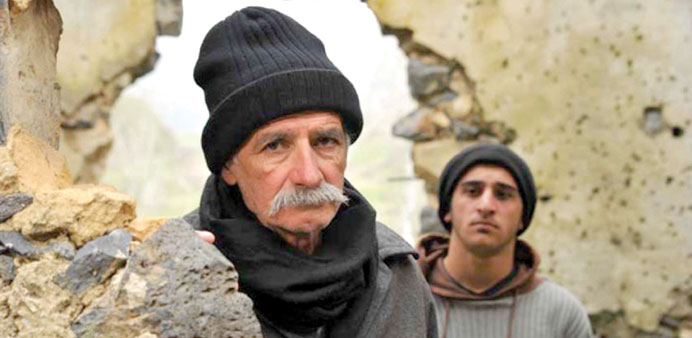By Anand Holla
Talk about setting new benchmarks. Five crisp short films, supported by Doha Film Institute (DFI), won a solid wave of applause from the audience at the inaugural edition of Qumra on Saturday night, giving Doha a glimpse into just how evolved the new wave of cinema from the region is becoming.
Since Qumra – Qatar’s first international film and creative industry gathering – is devised with a special focus on first-time and second-time filmmakers, the festival is seeing 30 films at various stages of production – 22 narrative feature films, four feature documentaries and four shorts – participate in a focused programme of industry sessions designed to take their idea to the next level of development.
In this context, the five short films screened at the Opera House assume considerable significance. Made with top production values and impressive finesse, each film had an interesting story to tell and managed to tell it well, and in style.
Syrian filmmaker Erab Tarabieh’s 21-minute short The Forgotten (Al Mansiyun) tells the heart-rending story of an old man named Mustafa who was driven from the Israeli-occupied Golan Heights around 45 years ago, and pines to return to the house he left behind.
He banks on a young smuggler to help him cross the Israeli border. However, Mustafa’s dementia befuddles his journey, making us wonder how one can return home if one can’t remember where home is.
Having grown up under Israeli military occupation, Tarabieh has made several award-winning shorts that document life under occupation in Palestine. This short had won the Best Short Film Award at the Doha Tribeca Film Festival in 2012, and it’s understandable why. The Forgotten makes you think beyond the obvious.
Born in Beirut as a Palestinian refugee, Nicolas Damuni’s incisive black comedy, the 10-minute-short Maqloubeh, is a comment on the mundaneness of Israeli law keepers’ high-handedness in Palestine.
As a voice on the radio explains the many variants of the traditional Palestinian meal Maqloubeh, five young men whip up their own version of the dish. Just when they are about to wolf it down, they are rounded up by cops. This is another one of those films that draw humour from the absurdity of life in occupied Palestine, and Damuni pulls it off with coolth.
Qatar’s Abdullah al-Mulla’s five-minute cinematic foray into existential issues, Old Airport Road, is a treat to watch simply for the way it is shot. As the note to the film says, “Delusional and aimless, a solipsistic young man wanders the city, lost in his imagination. Over the course of his day, his monologue provides an unintentionally sarcastic expose of the reality of being disconnected from family and friends.”
We get to be inside that young man’s head, as we hear those voices. It’s when he returns home and enters his room that he feels at peace. Al-Mulla, who has worked on seven short films, is now working on a screenplay “related to the cosmic sense of a relationship.”
Tunis-born Nadia Raïs’ 10-minute free-flowing animation short Survival Visa, is high on subtlety. The quality and impact of the animation is top-notch, and the social commentary on how we deal with imagined threats is spot on.
“Besieged by a terrorist plot,” the film’s note says, “select citizens are offered the opportunity to take part in a televised competition, in which the winners will receive a passport to escape a doomed society. As hysteria takes hold of the population, one man dreams of cheating the system and turning the tide of inevitable disaster.”
In the affable 24-minute short The Wall, or Al-Hayt, director Odette Makhlouf Mouarkech delves into “a seemingly impersonal structure that became the anchor of a community.” A deeply personal story is conveyed with love, nostalgia and warmth, as the cleverly framed shots visually complete the story that the characters recall, choosing to include even the off-camera bits for effect.
The wall of the film’s title is “steel-reinforced poured concrete.” During wartime, it protected its building’s inhabitants from shelling. “Through casual but intimate interviews with the individuals who remember the wall as a safe haven,” the note to the film says, “Mouarkech paints a fond and amusing portrait of a group of people who became a sort of family, creating intense camaraderie out of disaster.”
Little wonder then that the film won the Best Short Film Scenario Award from Metropolis and was selected for the delegation of the European Union to Lebanon at the 17th European Film Festival.

TURNING POINT: A still from The Forgotten.
